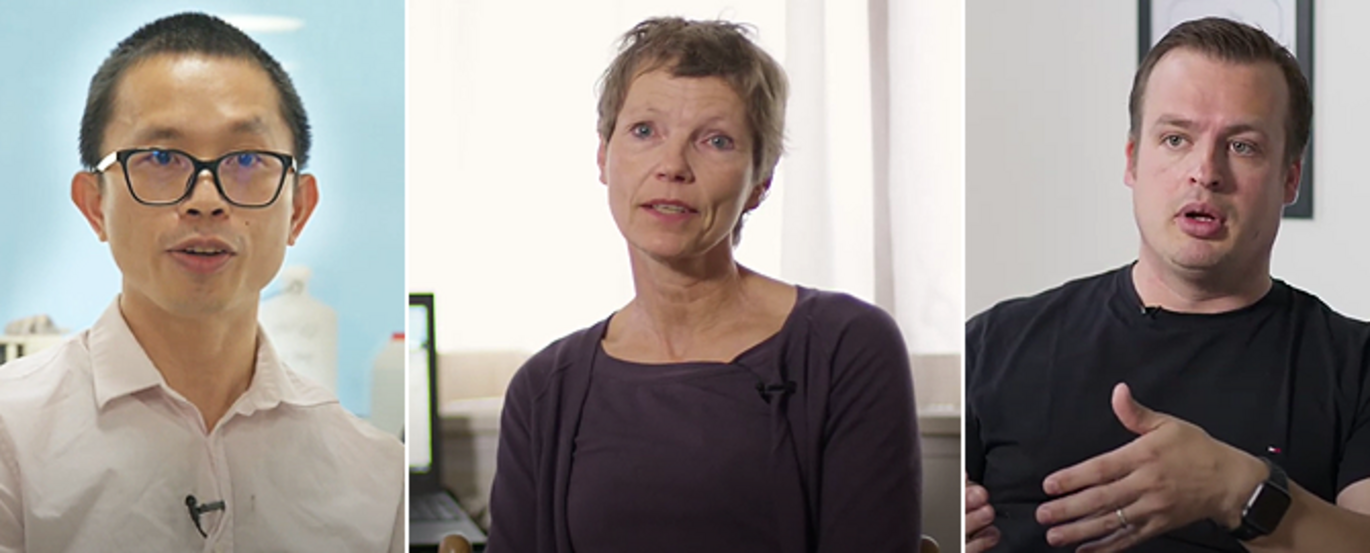VIDEO: Let an EU network further your career – especially if you are a junior researcher
Meet three Health researchers who regularly meet with prominent European colleagues. For them, the COST network has led to joint research projects and exchange visits abroad. And getting involved is neither particularly difficult nor bureaucratic.

Find a COST network with a goal which you are also interested in promoting, invest some energy in it, and increase the likelihood of ending-up collaborating with researchers you do not yet know by a few hundred per cent.
This is the gist of what three Health researchers say when explaining what they as researchers get out of involvement in one of the networks under The European Cooperation in Science and Technology. Or more succiently: An EU COST network.
And the three of them – Christoffer Laustsen, professor at the Department of Clinical Medicine, Vivi Schlünssen, professor at the Department of Public Health, and Yonglun Luo (generally known as Alun), who is an associate professor at the Department of Biomedicine – know what they are talking about. All three have found that one or more of the COST networks have helped to define their research careers, as they explain in a new video from the Research Support Office at Health (the text continues below):
"There's no doubt that the COST networks have helped define both the research I do and the events I take part in," says Christoffer Laustsen of his experience.
In the video, he emphasises the speed and efficiency that characterises COST networks as building blocks for the personally targeted research network. In Christoffer Laustsen’s case, this led to him currently helping to develop clinical protocols for MRI scans in an international collaboration that has secured a large grant to continue its work.
A fantastic scene to invite junior researchers into
Professor Vivi Schlünssen from the Department of Public Health has a similar experience. She is a partner in a Horizon 2020 project that directly stems from a previous COST collaboration. Here she is heading part of the project that has to do with work environment in Europe and chronic disease. One of the things Vivi Schlünssen notes is that in the COST networks you can cement your connections with other international names in the field – and this is true both as an established senior researcher and an up-and-coming name:
“COST is a fantastic scene to invite junior research colleagues into. It gives them a kind of framework – and a little financing – to build up their own network," says Vivi Schlünssen in the new video.
Exchange visits to other laboratories
The latter is also what the third participant in the video – Associate Professor Yonglun Luo, better known as Alun – found. He has been part of a COST network for more than six years, partly as co-organiser of network activities, and is currently working on an application for a completely new COST network:
"You don't just meet the most prominent experts in your field and expand your personal network enormously. There are also other advantages. Such as new opportunities to send students on training stays in some of the laboratories that are part of the network," says Yonglun Luo.
How do you get started?
The good news is that it is neither particularly difficult nor bureaucratic to begin networking via COST. The practical side of things is explained and exemplified in the article Get your research ideas to grow in an EU network, in which Vice-dean for Research Hans Erik Bøtker also shares his own experience as a long-standing COST member.
More about COST
- The most important resource is Health’s new COST website which brings together everything that is worth knowing. Other helpful sites include the EU’s own COST website and the Ministry of Higher Education and Science’s information site on COST.
- Approximately 25 COST networks currently have representatives from Aarhus University, Health – and eight of these networks were added to the list in 2020. AU researchers participate in a total of 78 COST networks.
- The Research Support Office regularly provides information about COST, ERC and consortium/cooperation projects in its newsletter and can also assist with applications.
Contact
Vice-dean for Research Hans Erik Bøtker
The Dean’s Office, Health
Email: boetker@au.dk
Mobile: (+45) 4029 3389